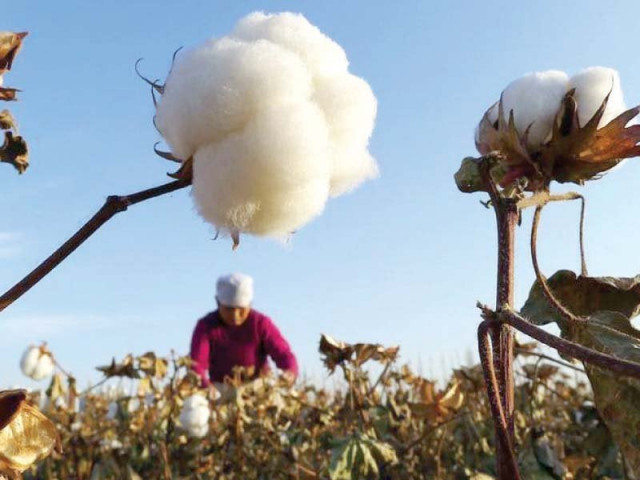Govt ignores opposition to duty withdrawal plan
Ministry argued scrapping of duties, taxes on cotton import would hurt farmers

The FBR argued that the cost of exemption from regulatory duty, additional customs duty and sales tax for the period of Jan-Jul 2020 would be around Rs4 billion. PHOTO: FILE
Many cotton farmers have already switched to the sugarcane crop due to alleged exploitation by textile millers but now they are being exploited by sugar millers.
Fiscal year 2018-19 had been a worst year for the cotton crop when the harvest dropped to very low levels due to the poor attention paid by the government.
According to experts, many previous governments had neglected the agriculture sector, where the growth fell during tenure of the previous government, and now the textile millers are influencing policymaking by the present government with implications for the farmers.
In Pakistan, transporters' strike causes loss of billions of rupees
Agriculture has become an industry but farmers are still being exploited. No valuable research has been conducted and the farmers are not being trained in value addition.
The Ministry of National Food Security, in a recent meeting of the Economic Coordination Committee (ECC) of the cabinet, said cotton was still lying with ginners and the farmers, and duty-free import of the commodity would hurt growers as it would deprive them of a fair price for their produce.
The ministry pointed out that all textile manufacturers were not going for exports and many of them were producing textile products to meet domestic demand.
According to the ministry, 1.4 million bales of cotton were currently lying with the ginners. As per estimate of the Federal Committee on Agriculture (FCA), 10.78 million bales would be harvested in the current season. Over three million bales have yet to reach the ginning factories and are lying with the growers.
It was pointed out that in order to facilitate the export-focused textile manufacturers, a scheme titled Duty and Tax Remission for Exports (DTRE) was in place to restrict the import of cotton to value addition.
Apart from that, under the manufacturing bond scheme, a manufacturer-cum-exporter can establish a manufacturing bond and import raw material for the manufacturing of finished goods without any upfront payment of duty and taxes. These schemes protected the growers as well as ginners.
Therefore, the Ministry of National Food Security did not support the proposed withdrawal of regulatory duty, additional customs duty and sales tax on the import of cotton.
On the other hand, the FBR argued that the cost of exemption from regulatory duty, additional customs duty and sales tax for the period of Jan-Jul 2020 would be around Rs4 billion based on average revenue collection in the past three years.
Therefore, it said, the revenue impact and the cost of exemption may be considered while deliberating on the proposal.
The ECC was of the view that the impact of withdrawal of duties on cotton import would be quite positive on the export of textile products, which would generate precious foreign exchange earnings. It removed the duties with effect from January 15, 2020.
Textile sector picks up but challenges remain
The ECC also noted that cotton was a cash crop and the backbone of Pakistan’s economy, however, its production had been continuously on the wane for the past many years. It underlined the need for evolving a comprehensive policy to enhance the production of cotton.
The Ministry of Commerce informed the ECC that the textile sector of Pakistan consumed around 12 to 17 million bales of cotton per annum.
Cotton consumption reached 16.31 million bales in 2007-08, 15.31 million bales in 2017-18 and dropped to 12.34 million bales in 2018-19. On the other hand, cotton production stood at 13 million bales in 2006-07, 13.96 million bales in 2014-15 and 9.9 million bales in 2018-19. Cotton imports had remained duty-free till 2014-15 when 1% customs duty was imposed along with 5% sales tax.
Later, the 1% duty was increased to 2% and then 3% along with 2% additional duty to make it 5%. At present, cotton import attracts 3% regulatory duty, 2% additional customs duty and 5% sales tax.
Under the prime minister’s incentive package for the exporters, announced on January 10, 2017, the textile sector was massively facilitated through the withdrawal of customs duty and sales tax on imported cotton with effect from January 16, 2017. However, the duties were re-imposed in July-August.
This year, the cotton production target is 15.001 million bales but latest data suggests the harvest will not be more than 10.20 million bales.
Published in The Express Tribune, January 16th, 2020.
Like Business on Facebook, follow @TribuneBiz on Twitter to stay informed and join in the conversation.


















COMMENTS
Comments are moderated and generally will be posted if they are on-topic and not abusive.
For more information, please see our Comments FAQ